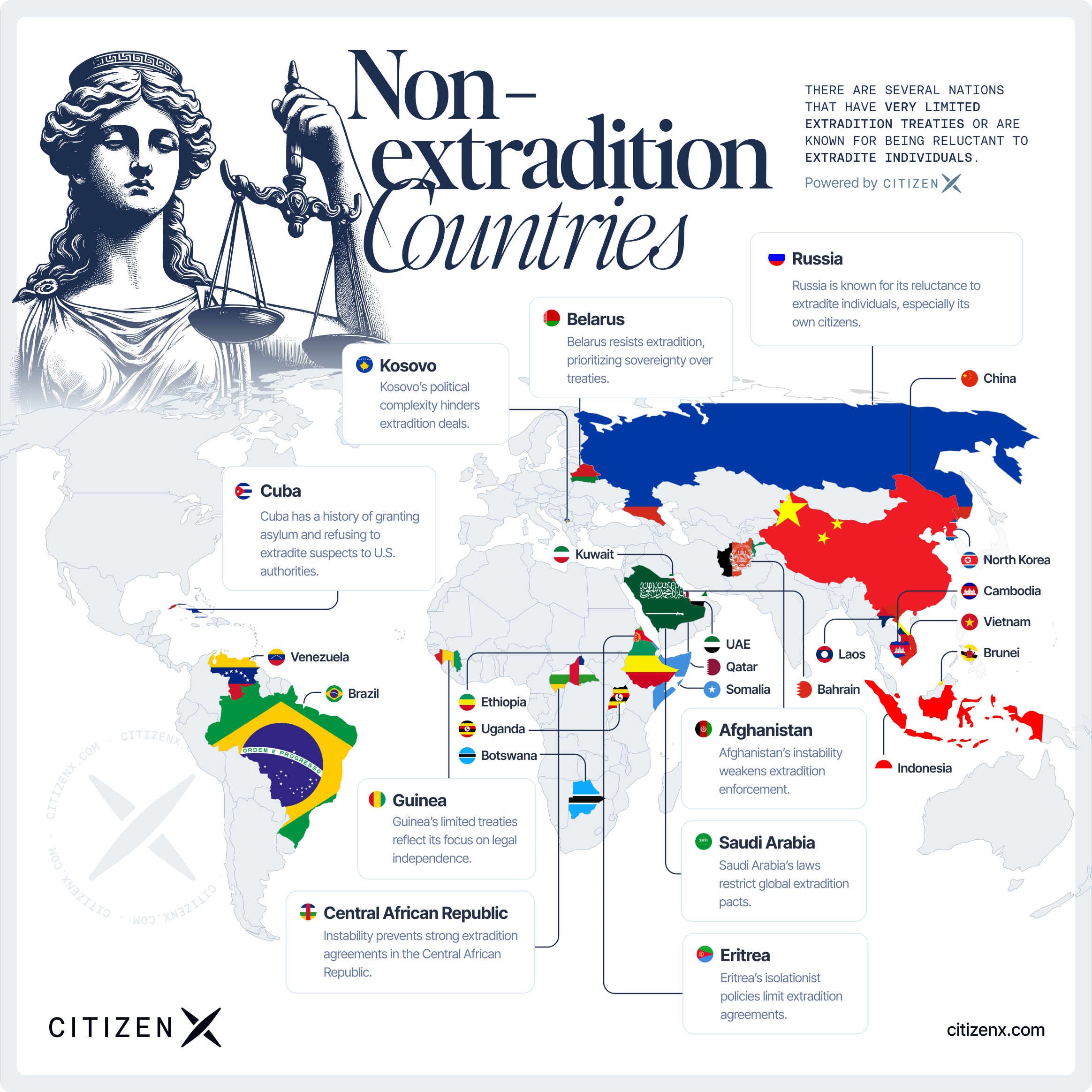The allure of a sanctuary foreign country, where one's assets, privacy, and, at times, personal freedoms and other basic human rights are safeguarded from international legal reach, is a topic both mysterious and invaluable.
Here, we demystify the status of non-extradition and unpack the layers of protection and independence it affords.

Understanding Non-Extradition Countries and Extradition Treaties — More Than Just a List
Non-extradition countries are those that do not typically surrender individuals to foreign governments for trial or punishment, under any terms or conditions.
While the term is often used loosely, it's essential to recognize the stark legal implications between countries with no extradition treaty at all and those that may refuse extradition on a case-by-case basis.
An Extradition Treaty is a formal agreement between two countries, enabling the transfer of individuals accused or convicted of a crime.
When a country has no such pact, it is considered a non-extradition country. However, the absence of a treaty does not automatically grant immunity; each country's internal laws play a crucial role in extradition cases.

The intricacies and nuance of extradition laws are naturally complex, and navigating them calls for strategic finesse and legal acumen. It is no wonder that individuals seeking refuge turn to the sanctuary of non-extradition countries. They offer a unique shield against the long arm of foreign justice systems.
This distinction can be a beacon of security for those who might find themselves at odds with the law in their home countries.
3 Benefits of Non-Extradition Treaties
1- Legal Protection
Perhaps the most crucial benefit for an individual seeking refuge is legal protection.
In the absence of an extradition treaty, the local laws of non-extradition countries take precedence, often providing a robust defense against international legal requests.
For those facing politically motivated charges or unfair legal systems, this protective layer is invaluable.

2- Asset Security
In the globalized economy, the protection of one's assets from seizure by foreign governments is a significant concern.
Non-extradition countries serve as safe havens for assets, safeguarding them from international litigation and ensuring financial security, even under tumultuous legal adversities.
3- Privacy and Confidentiality
The shield of privacy and confidentiality that non-extradition countries offer is another draw for high-profile individuals.
The discretion provided by these nations' legal systems enables anonymity and protects sensitive information from the public eye, a benefit that transcends mere legal protection.
Popular Destinations that have no Extradition Agreements
Among the roster of non-extradition countries, three categories stand out for their selectivity. There are countries that exhibit a steadfast refusal to enter into any extradition agreements, thereby refusing all such requests.
There are also nations that maintain sovereignty by declining extradition specifically to dominant global powers such as the United States and the United Kingdom.
Countries Without Extradition Treaties
Countries like North Korea, China, and Saudi Arabia have no known extradition treaties with any nation. This unconditional stance is a mark of national sovereignty, sometimes to the chagrin of the international community, but often in the service of the country's security and stability.
Non-Extradition Countries to the US
Several countries have refused to extradite individuals upon request of the U.S. government. This stance reflects varying levels of diplomatic relations and a desire to maintain independence in the face of American legal hegemony.

These are the countries countries without extradition treaties to the US:
| Region | Countries |
|---|---|
| Americas | Cuba |
| Africa | Algeria, Angola, Benin, Botswana, Burkina Faso, Burundi, Cameroon, Central African Republic, Chad, Comoros, DR Congo, Djibouti, Equatorial Guinea, Eritrea, Ethiopia, Gabon, Guinea, Guinea-Bissau, Ivory Coast, Madagascar, Mali, Mauritania, Mozambique, Namibia, Niger, Rwanda, Sao Tome and Principe, Senegal, Somalia, South Sudan, Sudan, Tanzania, Togo, Tunisia, Uganda, Western Sahara |
| Europe | Andorra, Belarus, Vatican City |
| Asia | Afghanistan, Armenia, Azerbaijan, Bahrain, Bangladesh, Bhutan, Brunei, Cambodia, China, Georgia, Indonesia, Iran, Iraq, Kazakhstan, Kuwait, Kyrgyzstan, Laos, Lebanon, Malaysia, Maldives, Mongolia, Nepal, North Korea, Oman, Pakistan, Palestine, Qatar, Saudi Arabia, Syria, Taiwan, Tajikistan, Thailand, Timor-Leste, Turkmenistan, United Arab Emirates (UAE), Uzbekistan, Vietnam, Yemen |
| Oceania | Vanuatu, Solomon Islands, Samoa |
Non-Extradition Countries to the UK
While the UK holds significant diplomatic power, some nations have historically declined extradition requests from British authorities, such as North Korea, Somalia, Afghanistan, Lebanon, Syria, Algeria, Libya, and Iraq.
Iceland, for one, famously refused to extradite the creators of the infamous Wikileaks to the UK, setting a precedent for countries' autonomy in their legal obligations to foreign states.

After Brexit, at least 10 EU countries have invoked constitutional rules that prevent them from extraditing their own nationals to the UK: Croatia, Finland, France, Germany, Greece, Latvia, Poland, Slovakia, Slovenia, and Sweden. Additionally, Austria and the Czech Republic will only extradite their nationals to the UK with their consent.
Non-Extradition Countries to Canada
Several countries do not have formal extradition treaties with Canada, including:
| Country |
|---|
| China |
| Iran |
| North Korea |
| Russia |
| Syria |
| Mongolia |
| Brunei |
| Some Gulf States |
| Montenegro |
| Serbia |
| Ukraine |
| Moldova |
| Vietnam |
| Cambodia |
| Laos |
| Maldives |
| Vanuatu |
| Indonesia |
| Ethiopia |
| Botswana |
| Tunisia |
Some countries, such as Austria, France, the Czech Republic, Germany, and Switzerland, have policies that allow for the deportation of foreigners but do not extradite their own nationals to Canada.

Non-Extradition Countries to Spain
Spain, with its potent influence in European countries and global affairs, encounters its share of challenges on the extradition front. Nations like Russia and China, showcasing their jurisdictional independence, have been known to deny extradition requests from Spain, highlighting the complex web of international legal protocols and the sovereignty of each state in such matters.
The saga of the former King of Spain in the middle east, Juan Carlos I, epitomizes the nuanced dance of diplomatic immunity and extradition processes at their most compelling. In August 2020, amid swirling accusations of financial impropriety and under the cloud of an international investigation, Juan Carlos I chose self-imposed exile in Saudi Arabia—a nation well-noted for its absence of an extradition treaty with Spain.
This maneuver underscores not only the personal strategies available to high-profile individuals in navigating legal predicaments but also the broader geopolitical choreography that shapes international justice, especially in cities like Dubai, Abu Dhabi, or Riyadh.
Saudi Arabia, by harboring a figure of such elevated status, reaffirmed its position on the global stage as a sanctuary for those seeking refuge from legal entanglements, thereby illuminating the complex interplay between national sovereignty, legal jurisdiction, and international diplomacy.

The Ultimate Non-Extradition Country: Venezuela
In an increasingly interconnected world, your citizenship isn't just a matter of identity—it's a powerful asset that can fundamentally shape your legal standing and personal sovereignty.
Venezuela's steadfast policy of not extraditing its citizens serves as a compelling illustration of this principle.
While many nations readily cooperate with international extradition requests, Venezuela's constitutional protection of its citizens showcases how a passport can serve as more than just a travel document—it's a shield of sovereignty that grants its holders specific legal protections.
This reality underscores a critical truth we've long emphasized at CitizenX: your citizenship portfolio isn't merely about expanded travel freedom or tax optimization—it's about having genuine legal safeguards in an unpredictable world.
Just as a prudent investor diversifies their financial assets, forward-thinking individuals understand that strategic citizenship planning can provide essential protections when they're needed most.
Choosing a Non-Extradition Country — Legalities, Lifestyle, and Laissez-Faire
Legal Factors
While the allure of non-extradition status is powerful, several legal factors come into play when choosing a refuge.
Understanding the laws and legal precedents of potential sanctuary countries is paramount.
Individuals need to conduct thorough research and seek specialized legal counsel to understand their rights and protections under foreign legal systems.

Lifestyle and Infrastructure
Selecting a non-extradition country is not merely a legal exercise but also a lifestyle choice. Factors such as quality of life, healthcare standards, and the ease of assimilation into a new culture must be considered.
Infrastructure, language, and personal networks play critical roles in making the transition and residence in a new country successful.
Four kinds of trust falling at the same time.
— Balaji (@balajis) November 11, 2022
Trust in vote counting
Trust in verified tweets
Trust in vouched reserves
Trust in visual images
Cryptographic verification is a partial solution. But also need high-trust startup societies.
Tax Implications
The financial implications of residency in a non-extradition country are substantial. For high-net-worth individuals, the taxation systems and financial policies of non-extradition nations can significantly affect personal wealth management and long-term financial planning.
Careful consideration is essential when evaluating potential tax obligations and advantages.
Case Studies: High-Profile Refuge Seekers
Edward Snowden
The case of Edward Snowden famously introduced non-extradition countries into the public discourse. The former NSA contractor sought asylum in Russia, a non-extradition country, after leaking classified information. His choice served as a strategic move to avoid prosecution in the United States, highlighting the powerful protection non-extradition status can provide.
Julian Assange
The founder of Wikileaks, Julian Assange, sought refuge in the Ecuadorian embassy in London to evade extradition to Sweden. His case became a poignant example of the lengths individuals might go to secure sanctuary and avoid extradition, particularly regarding politically sensitive charges.
Roman Polanski
The controversy around the extradition request of renowned filmmaker Roman Polanski, stemming from a decades-old sexual assault case, highlighted the various legal and diplomatic challenges extradition cases present. His situation underscored the importance of timely assessment and action when faced with potential legal issues and extradition threats.
Kim Dotcom
The case of internet entrepreneur Kim Dotcom, infamous for his involvement in the Megaupload file-sharing service, is a modern parable of the digital age and its legal gray areas. New Zealand, where Dotcom was residing at the time of his arrest, possesses an extradition treaty with the United States, thus making his location a serendipitous but temporary safe harbor.
Do Kwon
Do Kwon, co-founder of Terraform Labs, is known for the downfall of his cryptocurrency. He was arrested in Montenegro after being searched for worldwide, starting a captivating story about avoiding extradition. Despite living in a country that usually doesn't extradite to South Korea or the US, his case shows that international law enforcement can be unpredictable. Kwon's story is a reminder that even in countries that don't usually extradite, international justice can still reach. It's not just about escape and capture, but a warning about the reach of global legal systems for those seeking safety in non-extradition countries.

Crafting Your Path to Freedom: Second Passport as an Insurance Policy
The pursuit of a second passport is increasingly becoming a strategy of security and freedom for those seeking to insulate themselves from potential legal disputes and asset seizure. It is an insurance policy against political and legal volatility, a means of securing one's future in an increasingly turbulent geopolitical landscape.
This paradigm turns citizenship in non-extradition countries that protect their own citizens, such as Brazil, Switzerland, or Mexico, into a powerful asset.
However, with the privilege of sanctuary comes the responsibility of due diligence and a deep understanding of the chosen country's laws, culture, and way of life.
The commitment to integration, law-abiding behavior, and respecting the host nation's sovereignty are essential for a harmonious and secure experience.
For those considering the step into the sanctuary of a non-extradition country, it is a comprehensive, strategic, and at times, even cautious leap. Yet, for many, it represents the ultimate assertion of personal and legal autonomy — a pursuit of safety and freedom in a world where the concept of 'home' extends far beyond national borders.

